新概念英语第一册Unit57-58课文精讲精练
- 格式:doc
- 大小:58.50 KB
- 文档页数:6
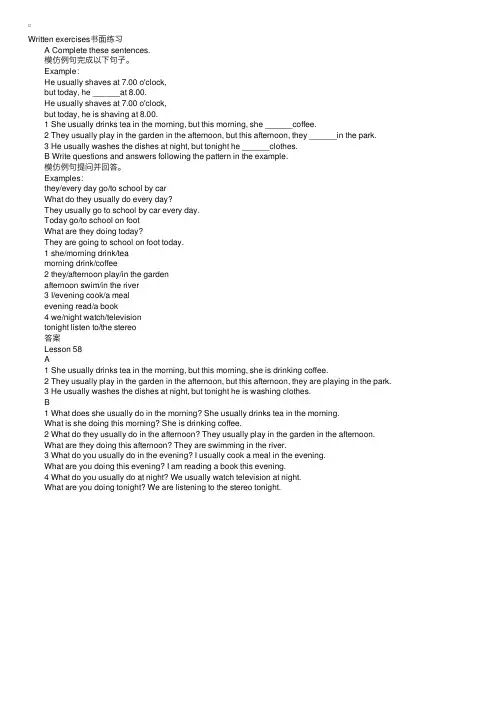
Written exercises书⾯练习 A Complete these sentences. 模仿例句完成以下句⼦。
Example: He usually shaves at 7.00 o'clock, but today, he ______at 8.00. He usually shaves at 7.00 o'clock, but today, he is shaving at 8.00. 1 She usually drinks tea in the morning, but this morning, she ______coffee. 2 They usually play in the garden in the afternoon, but this afternoon, they ______in the park. 3 He usually washes the dishes at night, but tonight he ______clothes. B Write questions and answers following the pattern in the example. 模仿例句提问并回答。
Examples: they/every day go/to school by car What do they usually do every day? They usually go to school by car every day. Today go/to school on foot What are they doing today? They are going to school on foot today. 1 she/morning drink/tea morning drink/coffee 2 they/afternoon play/in the garden afternoon swim/in the river 3 I/evening cook/a meal evening read/a book 4 we/night watch/television tonight listen to/the stereo 答案 Lesson 58 A 1 She usually drinks tea in the morning, but this morning, she is drinking coffee. 2 They usually play in the garden in the afternoon, but this afternoon, they are playing in the park. 3 He usually washes the dishes at night, but tonight he is washing clothes. B 1 What does she usually do in the morning? She usually drinks tea in the morning. What is she doing this morning? She is drinking coffee. 2 What do they usually do in the afternoon? They usually play in the garden in the afternoon. What are they doing this afternoon? They are swimming in the river. 3 What do you usually do in the evening? I usually cook a meal in the evening. What are you doing this evening? I am reading a book this evening. 4 What do you usually do at night? We usually watch television at night. What are you doing tonight? We are listening to the stereo tonight.。
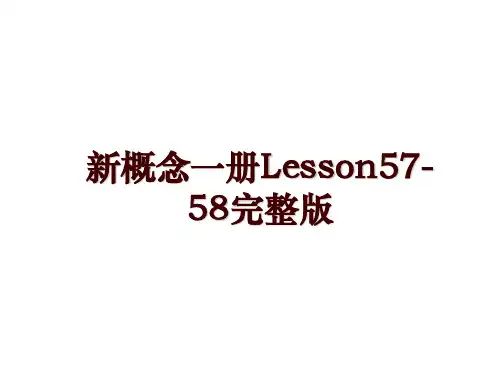

新概念第一册Lesson 57-58 练习单词/短语1. 点钟____________2. 商店____________3. 片刻,瞬间_____________4. 步行____________5. 坐小汽车______________6. 坐公交车____________7. 通常______________8. 在早上______________9. 待在家______________10. 花园___________11. 此刻____________12. 有趣的_____________单项选择题( ) 1. —It’s 8:00. The children ______ to school.A. walkB. walksC. walkingD. is walking( ) 2. The children ______ to school at 8:00 every day.A. walkB. walksC. walkingD. is walking( ) 3. Mrs Sawyer usually ______ tea in the living room in the afternoon. But now she ______ coffee in the garden.A. drinks; drinksB. drinks; drinkingC. drinks; is drinkingD. is drinking; drinks( ) 4. At the moment, Steven _______ basketball with his father.A. playB. is playingC. playsD. playing( ) 5. Listen! Lily ______ in the classroom.A. singB. singsC. singingD. is singing( ) 6. The children usually ______ their homework in the evening.A.doB. doesC. doingD. is doing( ) 7. —What are they ______ ? —They ______ books.A. are doing; are readingB. doing; readingC. doing; are readingD. doing; is reading( ) 8. —Is he ______ in the river? —Yes, she is.A. is doingB. are doingC. doesD. doing( ) 9. —_______ ? —They are watching television.A. What are they doingB. What can they doC. What are they doD. What do they do ( ) 10. —______ at night? —They usually wash the dishes at night.A. What are they doingB. What can they doC. What are they doD. What do they do句型转换1.He is reading books under the tree. (对划线部分提问)____________________________________________________________________2. They are going to school now. (改为一般疑问句)____________________________________________________________________3.My mother is cooking a meal in the kitchen now. (对划线部分提问)____________________________________________________________________4.We are watching television tonight.(改为否定句)____________________________________________________________________5.I’m running on the play ground. (对划线部分提问)____________________________________________________________________改错题。
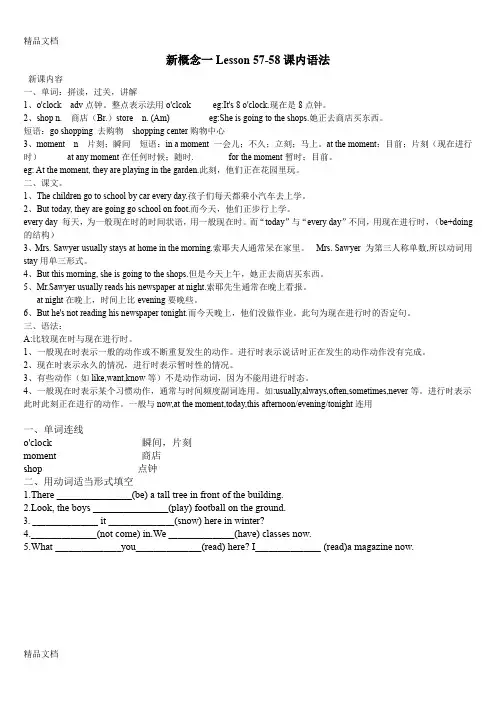
新课内容一、单词:拼读,过关,讲解1、o'clock adv点钟。
整点表示法用o'clcok eg:It's 8 o'clock.现在是8点钟。
2、shop n. 商店(Br.)store n. (Am) eg:She is going to the shops.她正去商店买东西。
短语:go shopping 去购物shopping center购物中心3、moment n 片刻;瞬间短语:in a moment 一会儿;不久;立刻;马上。
at the moment:目前;片刻(现在进行时)at any moment在任何时候;随时. for the moment暂时;目前。
eg: At the moment, they are playing in the garden.此刻,他们正在花园里玩。
二、课文。
1、The children go to school by car every day.孩子们每天都乘小汽车去上学。
2、But today, they are going go school on foot.而今天,他们正步行上学。
every day 每天,为一般现在时的时间状语,用一般现在时。
而“today”与“every day”不同,用现在进行时,(be+doing 的结构)3、Mrs. Sawyer usually stays at home in the morning.索耶夫人通常呆在家里。
Mrs. Sawyer 为第三人称单数,所以动词用stay用单三形式。
4、But this morning, she is going to the shops.但是今天上午,她正去商店买东西。
5、Mr.Sawyer usually reads his newspaper at night.索耶先生通常在晚上看报。
at night在晚上,时间上比evening要晚些。
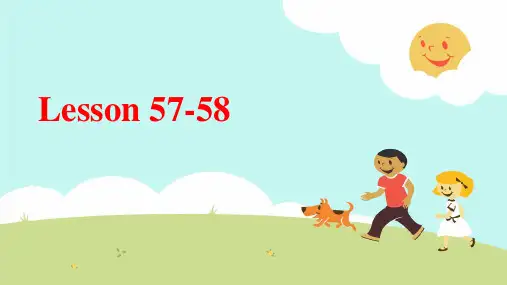
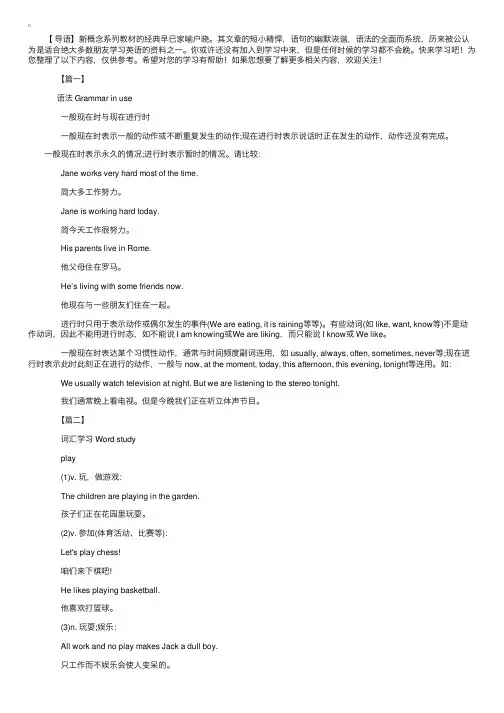
【导语】新概念系列教材的经典早已家喻户晓。
其⽂章的短⼩精悍,语句的幽默诙谐,语法的全⾯⽽系统,历来被公认为是适合绝⼤多数朋友学习英语的资料之⼀。
你或许还没有加⼊到学习中来,但是任何时候的学习都不会晚。
快来学习吧!为您整理了以下内容,仅供参考。
希望对您的学习有帮助!如果您想要了解更多相关内容,欢迎关注!【篇⼀】语法 Grammar in use ⼀般现在时与现在进⾏时 ⼀般现在时表⽰⼀般的动作或不断重复发⽣的动作;现在进⾏时表⽰说话时正在发⽣的动作,动作还没有完成。
⼀般现在时表⽰永久的情况;进⾏时表⽰暂时的情况。
请⽐较: Jane works very hard most of the time. 简⼤多⼯作努⼒。
Jane is working hard today. 简今天⼯作很努⼒。
His parents live in Rome. 他⽗母住在罗马。
He’s living with some friends now. 他现在与⼀些朋友们住在⼀起。
进⾏时只⽤于表⽰动作或偶尔发⽣的事件(We are eating, it is raining等等)。
有些动词(如 like, want, know等)不是动作动词,因此不能⽤进⾏时态,如不能说 I am knowing或We are liking,⽽只能说 I know或 We like。
⼀般现在时表达某个习惯性动作,通常与时间频度副词连⽤,如 usually, always, often, sometimes, never等;现在进⾏时表⽰此时此刻正在进⾏的动作,⼀般与 now, at the moment, today, this afternoon, this evening, tonight等连⽤。
如: We usually watch television at night. But we are listening to the stereo tonight. 我们通常晚上看电视。
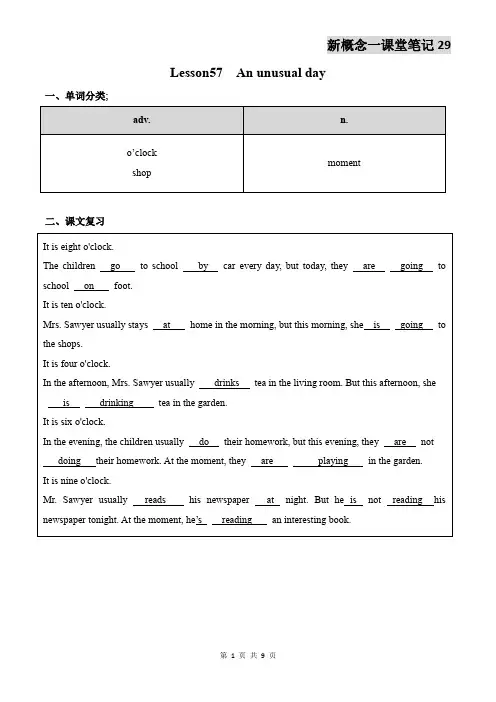
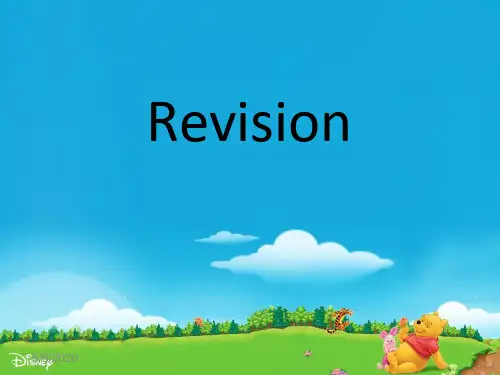
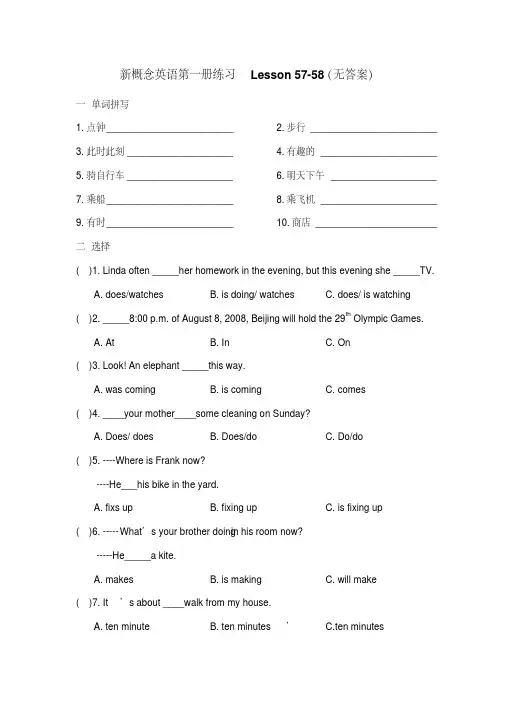
新概念英语第一册练习Lesson 57-58(无答案)一单词拼写1.点钟________________________2.步行________________________3.此时此刻____________________4.有趣的______________________5.骑自行车____________________6.明天下午____________________7.乘船________________________8.乘飞机______________________9.有时________________________ 10.商店_______________________ 二选择( )1. Linda often _____her homework in the evening, but this evening she _____TV.A. does/watchesB. is doing/ watchesC. does/ is watching ( )2. _____8:00 p.m. of August 8, 2008, Beijing will hold the 29th Olympic Games.A. AtB. InC. On( )3. Look! An elephant _____this way.A. was comingB. is comingC. comes( )4. ____your mother____some cleaning on Sunday?A. Does/ doesB. Does/doC. Do/do( )5. ----Where is Frank now?----He___his bike in the yard.A. fixs upB. fixing upC. is fixing up( )6. -----What’s your brother doing in his room now?-----He_____a kite.A. makesB. is makingC. will make( )7. It’s about ____walk from my house.A. ten minuteB. ten minutes’C.ten minutes( )8. ---Is it far from your home to school?----Not very, only ____.A. 15 minute’s rideB. 15 minutes’rideC. 15 minutes ride( )9. The restaurant is so popular here. Look, there are so many ___here.A. foodB. dishC. people( )10. We are having a party ____eight o’clock___the afternoon ___New Year’s Day.A. at/in/inB. at/on/inC. at/in/on( )11. English people ____use Mr. before a man’s first name.A. neverB. usuallyC. often( )12. ____he ____on well with his friends this term ?A. Does/ getsB. Does/getC. Is/ get( )13. Listen! Class Two ____an English song in the next room.A. are singingB. is singingC.was singing( )14.----How to say 6:35 in English?-----It’s _____.A. twenty five to sixB. twenty five to sevenC. thirty five to six( )15. -----How do you go back to your hometown every winter holiday?-----______.A. By 6 o’clockB. By seaC. By traveling三阅读In the morning Mr.Smith comes into the garden at the back of this house. Hesees much snow in the garden .Mr. Smith wants to take his car out, so he asks a man"Don’t throw anyto clean the road from his garage to the gate. He says to the man,snow on that side .It will damage the flowers in the street, or the policeman will come.” Then he goes out.When he comes back, the road is clean.There is no snow on the flowers, on the wall or in the street. But when he opens the garage, he sees the garage is full of snow, and his car is under the snow.( )1.In the morning Mr. Smith finds there is a lot of snow in ____.A. his gardenB. his garageC. his car( )2. He tells a man to clean the road, because he ___.A. doesn’t like snowB. want to keep the road cleanC. wants to takehis car out of the garage( )3. Where does Mr. Smith ask the man throw the snow?A. On the flowersB. Into the streetC. We don’t know( )4. He opens the garage and ____in itA. takes his car outB.finds it is full of snowC. finds the car isn’t( )5. Where’s Mr. Smith’s car?A. Under the snowB. In the streetC. Near the road四连词成句1. o’clock ten is it now_________________________________________________2. Mrs.Sawyer at stays home the morning in________________________________________________3. interesting reading he is an book_________________________________________________4. not doing they homework are their evening this_________________________________________________5. at moment what doing he is the_________________________________________________五翻译1.现在是六点钟。
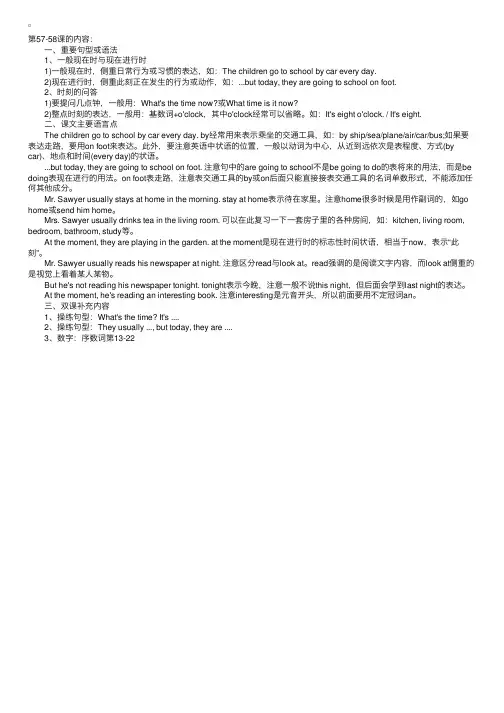
第57-58课的内容: ⼀、重要句型或语法 1、⼀般现在时与现在进⾏时 1)⼀般现在时,侧重⽇常⾏为或习惯的表达,如:The children go to school by car every day. 2)现在进⾏时,侧重此刻正在发⽣的⾏为或动作,如:...but today, they are going to school on foot. 2、时刻的问答 1)要提问⼏点钟,⼀般⽤:What's the time now?或What time is it now? 2)整点时刻的表达,⼀般⽤:基数词+o'clock,其中o'clock经常可以省略。
如:It's eight o'clock. / It's eight. ⼆、课⽂主要语⾔点 The children go to school by car every day. by经常⽤来表⽰乘坐的交通⼯具,如:by ship/sea/plane/air/car/bus;如果要表达⾛路,要⽤on foot来表达。
此外,要注意英语中状语的位置,⼀般以动词为中⼼,从近到远依次是表程度、⽅式(by car)、地点和时间(every day)的状语。
...but today, they are going to school on foot. 注意句中的are going to school不是be going to do的表将来的⽤法,⽽是be doing表现在进⾏的⽤法。
on foot表⾛路,注意表交通⼯具的by或on后⾯只能直接接表交通⼯具的名词单数形式,不能添加任何其他成分。
Mr. Sawyer usually stays at home in the morning. stay at home表⽰待在家⾥。
注意home很多时候是⽤作副词的,如go home或send him home。
Mrs. Sawyer usually drinks tea in the living room. 可以在此复习⼀下⼀套房⼦⾥的各种房间,如:kitchen, living room, bedroom, bathroom, study等。
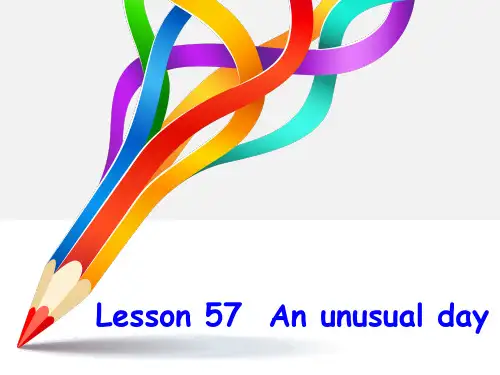
新概念英语第一册L e s s o n57-58练习题(无答案)-CAL-FENGHAI.-(YICAI)-Company One1Lesson 57 and Lesson 58一找出各组划线部分读音不同的单词(10分)( ) 1. A. ch i ldren B. morn i ng C. liv i ng-room D. ton i ght( ) 2. A. m o ment B. h o mework C. d o D. g o( ) 3. A. b e d B. t e n C. b e hind D. l e t( ) 4. A. m ea l B. t ea C. ea t D. br ea d( ) 5. A. wh o B. wh ere C. wh ich D. wh at( ) 6. A. the Sawyer s B. shop s C. drink s D. thi s( ) 7. A. b oo k B. classr oo m C. n oo n D. c oo k( ) 8. A. j u mp B. r u n C. f u ll D. D u tch( ) 9. A. wh ere B. n ear C. d ear D. Niger ia( ) 10. A. o ften B. o ver C. cl o ck D. st o p二用所给词的适当形式填空(10分)1. The ______ (child) go to school by car every day.2. Mrs. Sawyer usually does ______ (she) housework at home.3. This morning, Mrs. Sawyer is going ______ (shop).4. Mrs. Sawyer usually drinks tea in the ______ (live) room.5. The children usually do ______ (they) homework in the evening.6. Mr. Sawyer is reading an ______ (interest) book at the moment.7. It is nine ______ (clock).8. They sometimes go to school on ______ (feet).9. She usually washes the ______ (dish) after a meal.10. She has many letters ______ (type).三用所给动词的正确形式填空(10分)1. Wang Lin and I ______ (he) at school. We go to school every day.2. What ______ he ______ (do)3. She usually drinks tea in the morning, but this morning, she ______ ______ (drink) coffee.4. ______ Mike ______ (read) newspaper every night?5. Where is John?He ______ ______ (swim) in the river.6. What ______ she usually ______ (do) in the morning?7. The children ______ (play) in the garden at the moment.8. ______ Mr. Sawyer usually ______ (read) his newspaper at night?9. Look, the Sawyers ______ (watch) TV.10. I usually ______ (cook) a meal in the evening.四选择填空(20分)( ) 1. This shirt is too old. Give me a new ______, please.A. itB. oneC. onesD. them( ) 2. Can he ______ a meal?A. cookB. cooksC. cookingD. cooker( ) 3. Look! Jim ______ his clothe now.A. puts inB. in putting onC. inD. wearing( ) 4. The children aren’t going to school by car today. They are going to school ______.A. by footB. on footC. in footD. off foot( ) 5. ______ do you put the table?A. WhatB. WhoC. WhereD. Whose( ) 6. Where is your bag I can’t ______ it.A. putB. giveC. findD. look( ) 7. We can’t put it in the basket. The basket isn’t ______.A. bigB. fullC. emptyD. light( ) 8. She usually washes the dishes at night, but tonight she ______ clothes. A. wash B. washing C. is washing D. washes( ) 9. ______ your mother come from Beijing?A. IsB. DoesC. BeD. Do( ) 10. ______ play in the street!A. Aren’tB. Don’tC. BeD. Can’t( ) 11. Give the knife ______ me, please.A. forB. withC. toD. from( ) 12. How many cats can you see ______.A. Yes, I canB. I can seeC. No, I can’tD. I can’t see any( ) 13. What are they doing today They ______ to school on foot today.A. goB. goesC. goingD. are going( ) 14. What is George going to do He ______ the bookcase for his daughter. A. go to make B. goes to make C. is going to make D. makes( ) 15. Do you like your school ______.A. Yes, I doB. Yes, I likeC. Yes, I canD. Yes, I am( ) 16. ______ any flowers in the picture?A. Have thereB. Is thereC. HasD. Are there( ) 17. I have a new coat. ______ you like ______A. Are, itB. Do, itC. Can, itD. Must, it( ) 18. Look, Jane is eating ______ meat.A. aB. anyC. someD. many( ) 19. How many are there on the table Three.A.bottles of orangeB.bottles of orangesC.bottle of orangeD.bottle of oranges( ) 20. Does Mr. Sawyer go to work ______A. in carB. by carC. on carD. by his car五句型转换(10分)1. The children usually do their homework in the evening.(就划线部分提问) ______do the children usually ______ in the evening?2. He is reading an interesting book at nine tonight.(就划线部分提问)______ time is he ______ an interesting book?3. Mrs. Sawyer often drinks tea in the living-room.(就划线部分提问)______ does Mrs. Sawyer often ______ tea?4. They are playing in the garden.(变为一般疑问句)______ they ______ in the garden?5. They are going to school on foot.(就划线部分提问)______ are they ______ to school?6. She is going to the shops this morning.(改为同义句)She is ______ ______ this morning.7. She usually walks to school. (改为同义句)She usually ______ to school on ______.8. Mr. Sawyer sometimes goes to work by car. (改为同义句)Mr. Sawyer sometimes ______ his ______ to work.9. He usually shaves at seven o’clock every day. (改为一般疑问句)______ he usually ______ at seven o’clock every day?10. Mr. Sawyer usually reads his newspaper at night. (变为否定句)Mr. Sawyer ______ usually ______ his newspaper at night.六补全对话(10分)A: Hi, Wang Tao. Let’s go and ___1___ basketball.B: ___2___. I can’t.A: What are you doing ___3___B: I am ___4___ my homework. Go and ___5___ Jim.A: Thank you. ___6___ is he?B: He is ___7___ home.A: I am going to ___8___ house and ask him.___9___ your homework and I am ___10___.1. ______2. ______3. ______4. ______5. ______6. ______7. ______8. ______9. ______ 10. ______七对话搭配( ) 1. Where does Mrs. Sawyer usually stay in the morning?( ) 2. How are the children going to school today?( ) 3. What does Mr. Sawyer often do at night?( ) 4. Is the reading an interesting book now?( ) 5. Who usually cooks a meal in the evening?( ) 6. What do they usually do every day?( ) 7. Which seasons do you like best?( ) 8. Is your climate good?( ) 9. Does Mrs. Sawyer eat lunch at noon?( ) 10. Where does he come from?A.The children are going to school on foot today.B.He comes from Germany.C.Our climate is not very goodD.My mother usually cooks a meal in the evening.E.Yes, he is.F.Mrs. Sawyer usually stays at home in the morning.G.Mr. Sawyer often reads his newspaper at night.H.They usually go to work every day.I.I like spring and summer best.J.Yes, she does.八完形填空(10分)My name is Jim. ___1___ is my birthday(生日)and mum ___2___ me a big cake. I’m twelve now. I like cakes. ___3___ the table of my bedroom, you ___4___ see my lovely cake. You can ___5___ my name on it, too. There are some ___6___ things for my birthday. ___7___ are apples, pears and bananas, but I ___8___ to have some drink now. My ___9___ Bill and Sam are coming. I want to eat the food ___10___ my friends( ) 1. A. That B. This C. It D. Today( ) 2. A. finds B. cooks C. makes D. puts( ) 3. A. In B. At C. On D. Behind( ) 4. A. can B. must C. can’t D. don’t( ) 5. A. see B. look C. know D. write( ) 6. A. others B. the other C. other D. the others( ) 7. A. They B. It C. This D. That( ) 8. A. want B. wants C. take D. takes( ) 9. A. teachers B. sisters C. brothers D. friends( ) 10. A. from B. of C. with D. for九阅读理解(10分)This is a room in Jim’s house. It has a door and two windows. They are green. There is a desk, two chairs and a bed in it. There is a clock on the wall. The colour of the wall is white.Now it is seven in the evening. Jim is at home. He is doing his homework. There are two pens on the desk. Jim is writing with one.(1)选择填空( ) 1. What colour are a door and two windows?A. whiteB. blackC. greenD. brown( ) 2. Are there any ______ on the desk?A. chairsB. flowersC. pensD. a bookcase ( ) 3. What is Jim doing at seven in the evening?A. playing gamesB. doing his homeworkC. watching TVD. reading some books ( ) 4. Is there a ______ on the wall?A. mapB. mapC. pictureD. ruler( ) 5. Is Jim writing with his ______A. penB. pencilC. eraserD. ruler(2)判断对错,对用T,错用F( ) 1. There is a desk in Jim’s house.( ) 2. A door and two windows are red.( ) 3. There is a map on the wall.( ) 4. Jim is at home at seven.( ) 5. Jim is busy.。
2016新概念第一册L e s s o n57-58课堂及课后练习(总2页)--本页仅作为文档封面,使用时请直接删除即可----内页可以根据需求调整合适字体及大小--新概念一Lesson 57-58课内语法新课内容一、单词:拼读,过关,讲解1、o'clock adv点钟。
整点表示法用o'clcok eg:It's 8 o'clock.现在是8点钟。
2、shop n. 商店(Br.)store n. (Am) eg:She is going to the shops.她正去商店买东西。
短语:go shopping 去购物 shopping center购物中心3、moment n 片刻;瞬间短语:in a moment 一会儿;不久;立刻;马上。
at the moment:目前;片刻(现在进行时) at any moment在任何时候;随时. for the moment暂时;目前。
eg: At the moment, they are playing in the garden.此刻,他们正在花园里玩。
二、课文。
1、The children go to school by car every day.孩子们每天都乘小汽车去上学。
2、But today, they are going go school on foot.而今天,他们正步行上学。
every day 每天,为一般现在时的时间状语,用一般现在时。
而“today”与“every day”不同,用现在进行时,(be+doing的结构)3、Mrs. Sawyer usually stays at home in the morning.索耶夫人通常呆在家里。
Mrs. Sawyer 为第三人称单数,所以动词用stay用单三形式。
4、But this morning, she is going to the shops.但是今天上午,她正去商店买东西。
Lessons 57~58 What’s the time?
They usually…,but today, they are…
Words & Expressions: 生词和短语
o’clock moment at the moment n. 点钟n. 瞬间此刻
on foot by car
步行乘小汽车
Words Review:生词复习
1st 2nd 3rd
first second third
num. 第一(个) num. 第二num. 第三
5th 6th 7th
fifth sixth seventh num. 第五num. 第六num. 第七
8th 9th 10th
eighth ninth tenth
num. 第八num. 第九num. 第十
11th 12th
eleventh twelfth
num. 第十一num. 第十二
Sentence Patterns 重点句型
What’s the time? 几点钟了?
It is eight o’clock. 八点了。
The children go to school by car every day. 孩子们每天乘小汽车上学。
But today, they are going to school on foot. 但今天,他们步行上学。
Mrs Sawyer usually stays at home in the morning. 索耶夫人上午通常呆在家里。
But this morning, she is going to the shops. 但今天上午,她正去商店买东西。
In the afternoon, Mrs Sawyer usually drinks tea in the living room.
下午,索耶夫人通常在起居室喝茶。
But this afternoon, she is drinking tea in the garden. 。
但今天下午,她正在花园里喝茶。
In the evening, the children usually do their home. 晚上,孩子们通常作作业。
But this evening, they are not doing their homework. 但今晚,他们不做作业。
At this moment, they are playing in the garden. 此刻,他们正在花园里玩。
Mr Sawyer usually reads his newspaper at night.索耶先生通常在夜间看报。
But he’s not reading his newspaper tonight. 但今夜里他不在看报。
At this moment, he’s reading an interesting book. 此刻,他正在看一本有趣的书。
Class Practice 课堂过手练习
Sentence Pattern Drilling:句型演练
What’s the time? 几点钟了?
It is eight o’clock. 八点了。
The children go to school by car every day. 孩子们每天乘小汽车上学。
But today, they are going to school on foot. 但今天,他们步行上学。
In the afternoon, Mrs Sawyer usually drinks tea in the living room. 下午,索耶夫人通常在起居室喝茶。
But this afternoon, she is drinking tea in the garden.
但今天下午,她正在花园里喝茶。
回答问题,并用所给动词的正确形式:
What does Mr Smith usually do at 7 o’clock every day? What is he doing at 8 o’clock today?
He usually ____________ (shave) at 7 o’clock every day.
But today, he _____ _____ _____ _____ ______.
What do the children usually do in the afternoon? What are they doing this afternoon?
They usually ___________ (play) in the garden in the afternoon.
But this afternoon, they ______ ______(swim)in the river.
In the evening, the children usually do their home.
晚上,孩子们通常作作业。
But this evening, they are not doing their homework.
但今晚,他们不做作业。
At this moment, they are playing in the garden.
此刻,他们正在花园里玩。
Grammar 语法
Tips: 动词加ing的变化规则:
(1)一般情况下,直接加ing,如:cook-cooking,play-playing
(2)以不发音的e结尾,去e加ing,如:make-making
(3)如果末尾最后一个音节是重读闭音节,双写末尾的字母,再加ing,如:run-running, stop-stopping, sit-sitting, get-getting, forget-forgetting, begin-beginning, shop-shopping
Exercise
写出下列动词的现在分词形式,即正确地加上ing
1.work ________ sing _________ play ________ study_______
2.dance _______ have ________ write _______ take _______
3.run _________ sit ___________ shop _______ swim ______
o’clock moment at the moment
n. 点钟n. 瞬间此刻
on foot by car
步行乘小汽车
1st 2nd 3rd
first second third num. 第一(个) num. 第二num. 第三
5th 6th 7th
fifth sixth seventh num. 第五num. 第六num. 第七
8th 9th 10th
eighth ninth tenth num. 第八num. 第九num. 第十
11th 12th
eleventh twelfth num. 第十一num. 第十二。